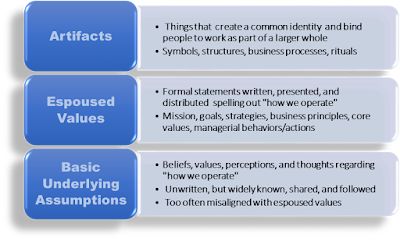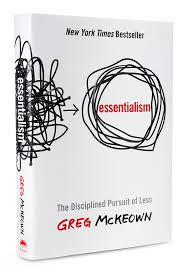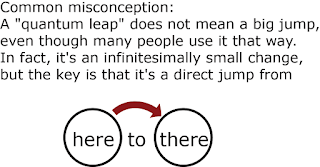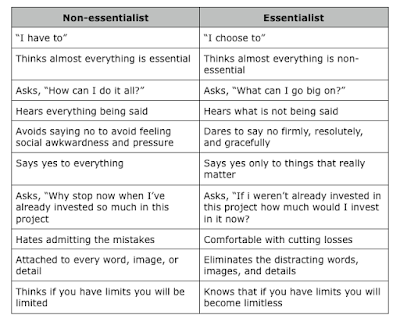I love the quote below from Anne-Marie Elias that I found in this article by Bryon Connolly from CIO about automation and humans.
"Business is moving from an ‘egosystem to an ecosystem"
Is your business an ecosystem or are you still shifting from egosystem?
Who will you become?
What will you do next?
Be remarkable.
Ian
Monday 30 July 2018
Friday 27 July 2018
Ask the great questions essential for sustaining shared-view
Learn more about the master-classes held in Ballarat on the fourth Wednesday of every month.
This post is the 'Ask the great questions essential for sustaining shared-view' chapter of the book.
In a nutshell
Most of our troubles, personal, local, organisational, national, and international, are fundamentally based in our perceived need to hang onto the world in here (my view), our issues with the world out there (other people's views), and, our failure to focus more on the world we share (ours).
The exciting news is that when we find and sustain shared-view (ours) we can triumph over all our troubles.
In business it's essential to sustain shared-view in 7 areas of significance.
Do so and I can guarantee you better business results at less human and business cost.
Below are the 7. Here's a short video on each of the 7 and more including a simple diagnostic
1. Where are you now (reality)?
2. Where are you going (possibility)?
3. Why are you going there (purpose)?
4. How will you get there (strategy)?
5. Who will do what and when (execution)?
6. How will you know you're on track (milestones and lead metrics)?
7. How will you behave along the way (culture and values)?
Sustaining shared-view in these seven areas of significance where the most successful leaders stand out, is part three of The Appreciative Leader handbook. Learn more about this handbook and how to get your copy.
This chapter is an addendum to the above.
The fertile ground is determining what question to ask through carefully assessing the situation and therefor ensure your question is in the right context. The right question in the wrong context can cause trouble! Ploughing the ground is then to ask the question. Seeding is being silent yet completely attentive while the person or people answer your question. The nurturing lies in how well you acknowledge their answers.
The cycle is complete (harvest) when you align answers with who people will become and what they will do next to implement their their answers and/r integrate their answers with what is already working for them.
3 recommended actions
1) In the master-class that workshopped the content herein participants prepared for the session by completing the diagnostic below which you can download here. Undertaking this yourself will give context to all that follows. A strong suggestions would be to ask each member of your team to complete the diagnostic and indicate each of their answers on one form. This will pave the way for great conversation leading to shared-view.
2) Participants also prepared for the master-class by answering the following two questions:
What’s the greatest question you’ve ever been asked?
And what’s the greatest question you’ve asked somebody else?
What are your answers?
My favourite answer was one from a female participant who challenged one of her bosses with Would you talk like that to your sister?
3) We also had great conversation in the master-class around the following quotes:
What are your thoughts? Who can you become and what will you do next to embrace these concepts?
"In leadership the conversation isn't about the work,
the conversation is the work."
David Whyte
Recommended deep work
1) Access the companion resources web page and download and use 'The great questions remarkable leaders often ask' ebook.
2) Over time develop a set of questions you can ask at appropriate times. I have a list of over 100 questions that I have tried, tested and proven. I simply wait for the right context to use them.
Usually I invest a great deal of time and energy contemplating which is the best question that will help this person be the best version of themselves.
3) Regularly take courses or participate in programs that will help you to continuously better your language, communication, presentation and conversation skills and attitudes.
Be remarkable.
Ian
Wednesday 25 July 2018
The two great questions
Today at my monthly master-class in Ballarat participants will be sharing their answers to the following great questions:
What’s the greatest question you’ve ever been asked?
What’s the greatest question you’ve asked somebody else?
What would your answers be?
In my next post I will share some of my master-class groups answers.
Be remarkable.
Ian
What’s the greatest question you’ve ever been asked?
What’s the greatest question you’ve asked somebody else?
What would your answers be?
In my next post I will share some of my master-class groups answers.
Be remarkable.
Ian
Monday 23 July 2018
The real work of leadership
Much of my work is helping business owners and leaders to be candid, convivial and compassionate in their communication, presentations and conversations, particularly in the areas pictured below.
Learn more and check your own performance by downloading the pulse check here.
Perhaps my all time favourite insight into leadership and conversations is this from poet David Whyte:
Who will you become?
What will you do next?
Be remarkable.
Ian
Learn more and check your own performance by downloading the pulse check here.
Perhaps my all time favourite insight into leadership and conversations is this from poet David Whyte:
In leadership the conversation isn't about the work
the conversation is the work.
the conversation is the work.
Who will you become?
What will you do next?
Be remarkable.
Ian
Friday 20 July 2018
Where are you now really?
Most of our troubles, personal, local, organisational, national, and international, are fundamentally based in our perceived need to hang onto the world in here (my view), our issues with the world out there (other people's views), and, our failure to focus more on the world we share (ours).
The exciting news is that when we find and sustain shared-view (ours) we can triumph over all our troubles.
In business it's essential to sustain shared-view in 7 areas of significance. Do so and I can guarantee you better business results at less human and business cost.
Below are the 7. Here's a short video on each of the 7 and more including a simple diagnostic
1. Where are you now (reality)?
2. Where are you going (possibility)?
3. Why are you going there (purpose)?
4. How will you get there (strategy)?
5. Who will do what and when (execution)?
6. How will you know you're on track (milestones and lead metrics)?
7. How will you behave along the way (culture and values)?
Being candid and honest with number 1. is essential otherwise everything thereafter is delusional.
Below is a simple yet profound exercise that I undertake with my clients to get number 1 precise.
Download the exercise.
Should you like some help give me a call on +61 418 807 898.
Be remarkable.
Ian
Wednesday 18 July 2018
Three new performance possibility pulse checks
I like simple diagnostic tools.
I particularly like them when I can write on them!
Three such tools are pictured below.
You can download all these pulse checks here.
I'm personally bored with online surveys and the fact that most people do nothing with the results (classical example employee engagement surveys) which pisses the people who complete them off and leads to further disengagement.
These pulse checks are completed manually. I’ve found that doing them non digitally, and without the obligatory computer generated report, to be good for the soul. I'm testing this and some other areas that impact my work with clients.
Here's to simple yet profound data collection that we actually use and that really can engage people.
Be remarkable.
Ian
I particularly like them when I can write on them!
Three such tools are pictured below.
You can download all these pulse checks here.
I'm personally bored with online surveys and the fact that most people do nothing with the results (classical example employee engagement surveys) which pisses the people who complete them off and leads to further disengagement.
These pulse checks are completed manually. I’ve found that doing them non digitally, and without the obligatory computer generated report, to be good for the soul. I'm testing this and some other areas that impact my work with clients.
Here's to simple yet profound data collection that we actually use and that really can engage people.
Be remarkable.
Ian
Monday 16 July 2018
Micro-statements, spikes and other great advice about public/professional speaking from Graham Davies
I've been hard at work in the past few weeks upgrading some material for my presentations and also developing some completely new material.
My trusty guide has been this book. Please read my previous recommendations about this wonderful resource here and here.
Since I first read this in 2011 I have kept it close by and have dipped into it frequently. This time I did a serious deep dive.
Graham's concept of micro-statements is a game-changer in presentation preparation. I've development several new ones recently and have road tested two of them very successfully in the past week.
Graham says "A micro-statement is a sequence of words that quickly and compellingly captures the essence of your presentation in a way that is specifically shaped for the needs of a specific audience at a particular time."
Other concepts I love about Graham's work are knowing our audience's starting and finishing position and spiking beginnings and endings.
Graham says "The audience will be persuaded to adopt the point of view in your desired finishing position because of the information and concepts contained in your micro-statement."
On spikes Graham says that they "must be sharp enough to turn them without pissing them off ... Spikes cut through to what the audience really needs to hear ... Effective spikes are the hard edges that cut through the fluff between you and the audience."
I segment most of my presentation into 20 minute pieces. Graham's 'Bare Knuckle' structure is perfect for this and for any time you need to prepare a speech whether you have 5 minutes, 5 weeks or 5 months.
Most leaders I meet can be better speakers.
There's also many good speakers who could be remarkable.
Whichever camp you're in I highly recommend Graham's book. Find out more about the book and Graham's work.
Be remarkable.
Ian
My trusty guide has been this book. Please read my previous recommendations about this wonderful resource here and here.
Since I first read this in 2011 I have kept it close by and have dipped into it frequently. This time I did a serious deep dive.
Graham's concept of micro-statements is a game-changer in presentation preparation. I've development several new ones recently and have road tested two of them very successfully in the past week.
Graham says "A micro-statement is a sequence of words that quickly and compellingly captures the essence of your presentation in a way that is specifically shaped for the needs of a specific audience at a particular time."
Other concepts I love about Graham's work are knowing our audience's starting and finishing position and spiking beginnings and endings.
Graham says "The audience will be persuaded to adopt the point of view in your desired finishing position because of the information and concepts contained in your micro-statement."
On spikes Graham says that they "must be sharp enough to turn them without pissing them off ... Spikes cut through to what the audience really needs to hear ... Effective spikes are the hard edges that cut through the fluff between you and the audience."
I segment most of my presentation into 20 minute pieces. Graham's 'Bare Knuckle' structure is perfect for this and for any time you need to prepare a speech whether you have 5 minutes, 5 weeks or 5 months.
Most leaders I meet can be better speakers.
There's also many good speakers who could be remarkable.
Whichever camp you're in I highly recommend Graham's book. Find out more about the book and Graham's work.
Be remarkable.
Ian
Friday 13 July 2018
Wednesday 11 July 2018
Why it pays to break the rules (great book by Francesca Gino)
This is a great book.
It's now on my recommended reading list.
It also has a great companion website.
My Amazon review is below.
Be remarkable.
Ian
It's now on my recommended reading list.
It also has a great companion website.
My Amazon review is below.
Be remarkable.
Ian
Monday 9 July 2018
The New Management
I agree with the words below from Steve Denning in his article for Forbes 'Why Today's Business Schools Teach Yesterday's Expertise’. Read his full article.
“The new management isn’t simply a new training course, or a process, or a methodology or an organizational structure that can be written down in an organizational manual and simply added to the ongoing agenda. It’s a different mindset with counterintuitive ideas that fly in the face of the assumptions of a "good" 20th century manager or the typical business school case.
Managers can't tell people what to do;
Control is enhanced by letting go of control;
Talent drives strategy.
Dealing with big issues requires small teams, small tasks, small everything;
Complex systems are inherently problematic, and must be descaled;
Companies make more money by not focusing on money,”
How does this new management happen?
In my view it happens best by seeing and adopting leadership and management as different yet in harmony with one another particularly when they are underpinned by culture.
Below is my foundational model for teaching my clients to apply the above in their own best way:
This is my blog post of 25th August 2014 where I explore what I believe is new management further. Management today for me is all about processes, policies, procedures, practices and systems.
Who will you become?
What will you do next?
Be remarkable.
Ian
“The new management isn’t simply a new training course, or a process, or a methodology or an organizational structure that can be written down in an organizational manual and simply added to the ongoing agenda. It’s a different mindset with counterintuitive ideas that fly in the face of the assumptions of a "good" 20th century manager or the typical business school case.
Managers can't tell people what to do;
Control is enhanced by letting go of control;
Talent drives strategy.
Dealing with big issues requires small teams, small tasks, small everything;
Complex systems are inherently problematic, and must be descaled;
Companies make more money by not focusing on money,”
How does this new management happen?
In my view it happens best by seeing and adopting leadership and management as different yet in harmony with one another particularly when they are underpinned by culture.
Below is my foundational model for teaching my clients to apply the above in their own best way:
This is my blog post of 25th August 2014 where I explore what I believe is new management further. Management today for me is all about processes, policies, procedures, practices and systems.
Who will you become?
What will you do next?
Be remarkable.
Ian
Friday 6 July 2018
The essential ingredients for creating a vibrant culture in your business
I like this in depth article by Tom Kayser and the template he uses that's pictured below.
I suggest reimagining and reinventing one area at a time in your business in collaboration with your employees and other stakeholders.
While completing the above consider and answer the following question Does this reinvention mean it's simple for people to bring the best version of themselves to their work?
If your answer is no you still have reinvention work to do.
Be remarkable.
Ian
I suggest reimagining and reinventing one area at a time in your business in collaboration with your employees and other stakeholders.
While completing the above consider and answer the following question Does this reinvention mean it's simple for people to bring the best version of themselves to their work?
If your answer is no you still have reinvention work to do.
Be remarkable.
Ian
Wednesday 4 July 2018
Personal and organisational transformation with David Ednie
This is the second in a series of conversations David Ednie and myself are having about being human in a digital age.
You'll find the first video here.
Be remarkable.
Ian
You'll find the first video here.
Be remarkable.
Ian
Monday 2 July 2018
Pursue daily being better and wiser
Learn more about the master-classes held in Ballarat on the fourth Wednesday of every month.
This post is the 'Pursue daily being better and wiser' chapter of the book.
In a nutshell
I'm very grateful to my friend, colleague and mentor Glenn Capelli who was the special guest presenter at the master-class on this topic. Glenn's inspiration wisdom, work and wit has greatly influenced this chapter. Here's Glenn's handout from the master-class.
Fertile Ground - Embrace 'essentialism', Ploughing - Choose one-thing, Seeding - Stretch your mind, Nurturing - Create and Take, Harvest - Integrate.
I engaged Nick Haines and Matthew Newnham from Five Institute as my mentors for about a year in 2015/16.
'Essentialism' was a book they recommended.
I have since integrated the central philosophy of "less but better" into my whole life (it's a work in progress!) You can learn more about this concept here.
Working with Nick and Matthew also highlighted the fact that I was offering too much at once to my clients and particularly prospective clients. They suggested a "less but better" way was only offering one-thing at a time. This fitted perfectly with my use of the science of quantum leaps (see below).
Fascinatingly I was blinded to this in my work offerings and so this became a very large FBO (flash of the bloody obvious).
The above work help to quiet my mind and as well as stretch it. I also began to revisit some of Glenn Capelli thinking insights.
All of the above has been instrumental too in helping me to integrate change in my own life as well as help my clients to integrate their learnings through working with me with what is already working well for them.
3 recommended actions
1) Choose one of the 'Essentialist' ways of being every month and integrate each into your life and work.
2) Do some activity every day that will stretch your mind.
3) Fully embrace quantum leaps in all your becoming and all your doing.
The great thing about living your life as a series of quantum leaps is that when you have missteps, make mistakes and encounter mayhem, you can move on armed with new learning literally in the next moment.
Recommended Deep work
1) Contact Glenn Capelli and get your personal copy of his book 'Thinking Caps' and work your way through each section.
In the context of pursuing daily being better and wiser I recommend the concepts of kaizen and widezen, pages 81 - 89, as a great place to start.
2) Make it your personal mission to keep your mind agile. And nurture taking an agile mindset into everything you do in your life.
This How Leaders Can Improve Their Thinking Agility article by Jesse Sostrin for Strategy + Business may help. I personally like the model used (see below).
Source: Herrmann International, PwC research
http://www.strategy-business.com/thinkingagility
©2017 PwC. All rights reserved.
3) Create a process where you will always integrate new learning with what you're already doing that is working well for you.
As always should you like some help with any of the above then please get in touch with me.
Be remarkable.
Ian
Subscribe to:
Posts (Atom)




















